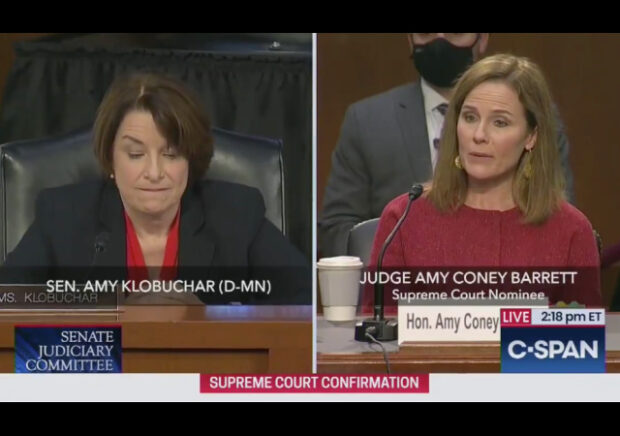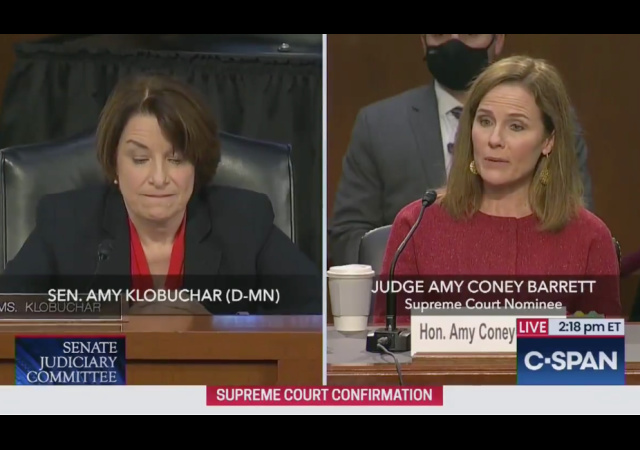Posted by Mary Chastain
Hey, Klobuchar. Even RBG criticized SCOTUS’s reasoning on Roe v. Wade.

Hey, Democrats. You cannot “gotcha” Judge Amy Coney Barrett.
Sen. Amy Klobuchar kept trying to push Barrett to explain why she doesn’t consider Roe v. Wade as “super-precedent,” which means it’s untouchable or unshakable.
Barret explained her position, but also reminded Klobuchar that even progressive scholars don’t consider the abortion law as “super-precedent.”
From CNN:
Klobuchar followed by asking if Barrett if she thought Roe v. Wade was a super precedent.
“Well people use super precedent differently. The way that it’s used in the scholarship and the way that I was using it in the article the that you’re reading from was to define cases that are so well settled that no political actors and no people seriously push for their overruling and I’m answering a lot of questions about Roe, which I think indicates that Roe doesn’t fall in that category,” Barrett said
“And scholars across the spectrum say, that doesn’t mean that Roe should be overruled, but descriptively it does mean that it’s not a case that everyone has accepted and doesn’t call for its overruling,” she added.
Klobuchar then pressed Barrett about why she was willing to call Brown v. Board of Education a super precedent, even though the Supreme Court has not classified it as such, but will not say the same about Roe v. Wade, despite the Supreme Court’s ruling opinion describing it as a super precedent in the Planned Parenthood v. Casey case.
Barrett responded, “Well, senator I can just give you the same answer that I just did.”
Judge Amy: 1
Senator Amy: Ouch. pic.twitter.com/G2XAUXQMdK
— ForAmerica (@ForAmerica) October 13, 2020
Pressed by Sen. Amy Klobuchar, Supreme Court nominee Amy Coney Barrett says she doesn’t classify Roe v. Wade as a “super-precedent” that would never be overturned, but says “scholars across the spectrum say it doesn’t mean that Roe should be overruled.” https://t.co/OFIhfeo130 pic.twitter.com/j2ayQncHK4
— ABC News (@ABC) October 13, 2020
Um, could someone remind Klobuchar what RBG said about their precious Roe v. Wade? Because:
The seven to two judgment in Roe v. Wade declared “violative of the Due Process Clause of the Fourteenth Amendment” a Texas criminal abortion statute that intolerably shackled a woman’s autonomy; the Texas law “except[ed] from criminality only a life-saving procedure on behalf of the [pregnant woman].” Suppose the Court had stopped there, rightly declaring unconstitutional the most extreme brand of law in the nation, and had not gone on, as the Court did in Roe, to fashion a regime blanketing the subject, a set of rules that displaced virtually every state law then in force. Would there have been the twenty-year controversy we have witnessed, reflected most recently in the Supreme Court’s splintered decision in Planned Parenthood v. Casey? A less encompassing Roe, one that merely struck down the extreme Texas law and went no further on that day, I believe and will summarize why, might have served to reduce rather than to fuel controversy.
—
Ginsburg said that she believed it would have been easier for the public to understand why the Constitution protected abortion rights if it the matter had been framed as one of equal protection rather than privacy. And in fact, there was a specific case she had in mind as one that should have driven the national conversation, instead of letting Roe carry that weight.
She told the Senators that she “first thought long and hard” about abortion rights when, as a lawyer for the American Civil Liberties Union (ACLU), she took on Struck v. Secretary of Defense, a case that was on the Supreme Court’s calendar during the same term that Roe was decided. Susan Struck was an Air Force Captain who got pregnant while serving in Vietnam and sued the Air Force after it said she would have to either get an abortion at the base hospital or leave if she wanted to have the child. She told the Air Force that she didn’t want to get an abortion; she wanted to use the vacation days that she had saved up to give birth and then put the baby up for adoption because abortion violated her Roman Catholic faith.
Even the president of National Abortion Rights Action League wanted senators to make sure RBG will uphold the law that allows women the right to murder their unborn child.
RBG said in 2019 that Roe v. Wade “has pretty strong precedential weight by now.” Does that mean she considered it super-precedent? I do not know for sure, but the wording makes me think that RBG also did not consider it super-precedent.





